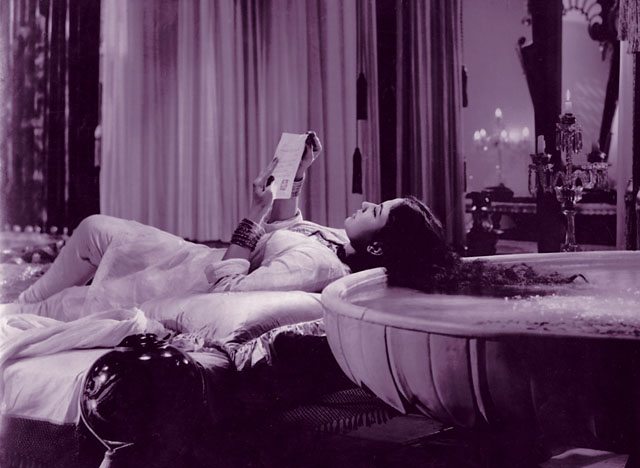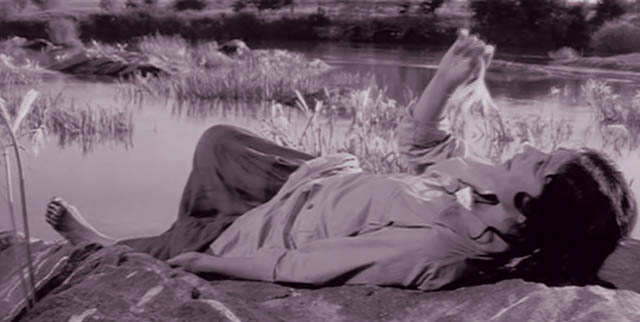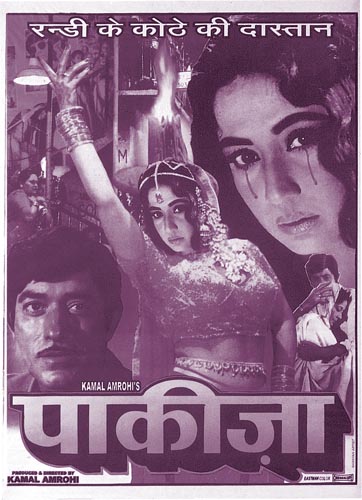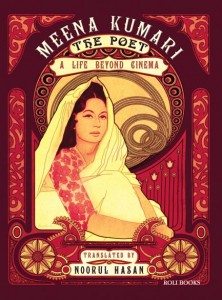
Meena Kumari – Poet in Search of Self, Life, Death
[dropcap]W[/dropcap]e’ve all known and loved her – Meena Kumari, the tragic beauty who brought so many wonderful films to life. Many of us have seen her films in crowded theaters in India while another generation has experienced the power of her work via videos, catching on to her life after it was already over.
Most of us don’t know that she was a poet too, writing in Urdu. Now her words have been lovingly gathered into a book, ‘Meena Kumari, the Poet – A Life beyond Cinema’, and fans, poetry lovers and the merely curious will be able to see what made her tick, what were her innermost thoughts
Meena Kumari, in reel life and real, was always ill-starred, always lovelorn. Who can forget the beautiful tragic Choti Bahu of ‘Sahib Bibi aur Ghulam’ who drinks herself to death in trying to win back her philandering husband? In ‘Pakeeza’ as a courtesan, she perhaps played her finest role, highlighting the longings and dreams of a woman even as she continues to be treated as a piece of merchandise in the marketplace, to be bought and sold to the highest bidder. The film was produced by her ex-husband Kamal Amrohi, and it was a troubled film, taking almost 14 years to complete.
[dropcap]M[/dropcap]eena Kumari was a superlative actress who starred in over 90 films, contributing to the sheen of the golden age of Hindi cinema. She started out as a child actor known as Baby Meena and was the family’s provider. She won the first ever Filmfare award for ‘Baiju Bawra’, and went on to act in several noted films including ‘Daera’, Parineeta’ and ‘Dil Apna aur Preet Parayi’. In 1962 she actually bagged all three nominations for the Filmfare Best Actress award – for her roles in ‘Aarti’, ‘Main chup Rahungi’ and ‘Sahib Bibi Aur Ghulam’ – winning the award for her stunning performance in the latter film, produced by Guru Dutt.
Meena Kumari in ‘Sahib Bibi Aur Ghulam’
Meena Kumari, the Poet – A Life Beyond Cinema
[dropcap]H[/dropcap]er life, replete with troubled relationships and an addiction to alcohol which finally led to her death in 1972, was not unlike a cinematic melodrama. In fact, Meena Kumari, whose real name was Mahjabeen Bano, had a personal life almost as stormy as her film roles. She found relief in penning her thoughts and was an accomplished poetess. ‘Meena Kumari, the Poet – A Life beyond Cinema’, has her collected poems translated from Urdu to English by Noorul Hasan and an introduction by Philip Bounds and Daisy Hasan.
There is a deep sadness in all her poems, a deep alone-ness and loneliness, a sense of loss – and yet no fear of death. She seems almost intrigued by it, seduced by its inevitability and the peace it offers.
Recently I came across this Youtube video of the noted poet Javed Akhtar reminiscing about the iconic star whom he never actually met and I thought you would enjoy the insights from him, as well as the following poems by Meena Kumari.
Zindagi Yeh Hai
Subh se sha’m talak
Doosro’n ke liye kuch karna hai
Jisme’n khud apna koi naksh nahin
Rang us paikare-tasweer hi mein bharna hai
Zindagi kya hai, kabhi sochne lagta hai yeh zehan
Aur phir rooh pe cha jate hain
Dard ke saye, udasi ka dhuan, dukh ki ghata
Dil mein rah-rah ke khayal a’ta hai
Zindagi yeh hai to phir maut kise kahte hain ?
Pyar ik khwab tha, is khwab ki ta’bir na pooch
Kya mili jurme-wafa ki hame’n ta’zir na pooch
This is Life
From morning to night
We must do things for others,
That living picture must be vivified
In which there is no trace of one’s self.
What is life, the mind sometimes wonders
And then the soul
Is overcast by shadows of grief
The smoke of despondency
Clouds of agony.
My heart wonders incessantly
If this is life, what is it that they call death?
Love was a dream
Ask not about the fate of this dream
Ask not about the punishment I received for the
crime of loyalty

Meena Kumari – Art Without Artfulness
[dropcap]B[/dropcap]esides collecting Meena Kumari’s poems together in one volume, the book also gives solid background into her life, into her troubled relationships and her descent into alcoholism.
“Hers is an art without artfulness,” writes Noorul Hasan in his introduction, “The sheer audacity of her statements is the raison d’être of her poetry. Her unadorned, screaming verse reminds me of snatches of Donne, Firaq, Wordsworth, and Ghalib. This is not to say that she is anywhere near the dizzying heights scaled by that august fraternity. Her poetry is slight, casual, a kind of intermittent adventure or a holiday she allowed herself from her self-consuming stardom.”
Philip Bounds and Daisy Hasan show the intricate connection between Meena Kumari’s poetry and her film roles: ” Condemned in her work as an actress to go along with the industry’s crude stereotypes of female virtue, Kumari strove in her poetry to evoke the multilayered realities of what she regarded as her authentic self.”
Her poems are about the intersection of reel life and real life: “There is a vivid example of this in ‘The Empty Shop’, one of the most powerfully concentrated of all her lyrics. At the heart of the poem is the irreconcilable contradiction between Kumari’s spiritual aspirations and the culture industry’s shallow materialism. Popular culture is figured as ‘The Shop of Time’, peddling gaudy commodities to a credulous public in order to distract their attention from life’s disconcerting brevity.”

Khali Dukan
Waqt apni dukan kyon sajaye baitha hai
Mer’e samn’e –?
Wo cheeze’n jinki kharidar thi mai’n
Kaha’n hain –?
Ye musnui masar’raton ke khiloney
Shohrat ke ye kaghzi phool
Aur daulat ki ye momi dunia
Jo sheesh’e ki almarion mein ba’nd hain
(ki kisi ke choo len’e se pighal jo sakti hain)
Yeh wo cheeze’n nahin hain jinhe’n mai’n khareedna chahti hoo’n
Pyar ka ek khoobsurat khwab
Jo meri sulagti hui a’nkh mein thandak bhar de
Mohabbat ka ek purtapak lamha
Jo meri bechain rooh ko pursukoon kar de
Bas inhin ek do cheezo’n ki mai’n khareedar thi
Aur waqt ki dukan in cheezo’n se khali hai
The Empty Shop
Why has Time spread out its wares before me?
Where are the things
I used to buy?
These spurious toys of pleasure
Paper flowers of fame
These wax dolls of wealth
Locked in glass cases
(That can melt at anyone’s touch)
These are not the things I wish to buy
A handsome dream of love
Which can cool my inflamed eyes
A moment of perfect intimacy
Which can soothe my restless soul
I came looking for nothing but these
And the shop of Time
Supplies none of these things.
[dropcap]A[/dropcap]sked if Meena Kumari would have been pleased to see the response of the world to her poetry, Noorul Hasan said, “The book foregrounds her voice. Her poetry is the finest expression of her authentic self. It reveals a side of the actor that was not on display in her films. It may have pleased her to see a more rounded image of herself presented to the Indian public.”

( Poems reprinted with the permission of Roli Books. You can read the entire collection of poems – both in Urdu and the English translations – in ‘Meena Kumari, the Poet’. It can be purchased over flipkart.com or from rolibooks.com.)
.

5 Comments
Via Google +
Fida Ibrahim 1+
Great..I luv her;))
Amal Jhaveri, the original poems were in Urdu and have been translated into English.Both versions are in the book so you can judge for yourself.
Thank you Kalpanaa – I love these images too and of course, the stunning video clips from ‘Sahib Bibi Aur Ghulam’. Meena Kumari was truly unmatched.
Love the romantic photos of this many talented, much loved woman. Wonderful post Lavina.
Thanks for the very informative article on your blog. Please let me know if all the poems are written in English, Hindi or Urdu? Many times the translations are different from the original.